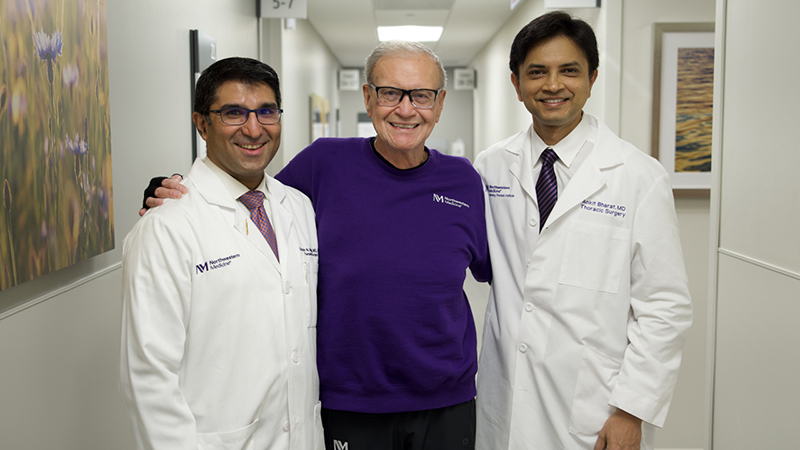‘Sesame Street’ and ‘Donkey Hodie’ Puppeteer Receives Lifesaving Proton Therapy for Hard-to-Reach Skull Base Tumor
Routine Dental Checkup Leads to Chordoma Diagnosis
Published May 2024
Frankie Cordero is no stranger to the unique, starting with his career. The 42-year-old is a puppeteer for "Sesame Street" as well as a puppeteer, puppet builder, and director for Chicago-based Spiffy Pictures ('Donkey Hodie'). His interest in puppetry began at 3 years old and by age 10, he was performing his own original hand puppet shows throughout his hometown of Chicago.
Frankie was diagnosed with chordoma, a rare type of cancer that occurs in the bones of the spine or skull.
Proton beam therapy was the most effective treatment for his tumor.— Vinai Gondi, MD
Fast Facts About Chordomas
- All types are cancerous.
- They can be very difficult to remove and treat due to how close they are to critical structures such as the brainstem, spinal cord, and vision nerves.
- Common chordoma symptoms include:
- Numbness and tingling
- Weakness in the extremities
- Urinary and bowel incontinence
- Vision issues
- Difficulty swallowing
- One-third of chordomas are clival chordomas, which occur at the base of the skull. This is the type of chordoma Frankie had.
Finding Frankie's Chordoma
Frankie's diagnosis was also unique. It began with a routine dental checkup. While viewing Frankie's X-rays, the dental technician noticed calcification in his nasal cavity and thought it could be sinusitis. The technician suggested Frankie follow up with his primary care physician.
Using a CT scan, Frankie's physician confirmed that he had sinusitis, or sinus inflammation. The CT scan also showed a tumor on the base of his skull, which turned out to be a chordoma.
The chordoma was slow-growing and beginning to approach vital parts of Frankie's brain. Surprisingly, Frankie didn't have any symptoms, but he needed to have surgery to prevent the chordoma from spreading. Frankie underwent a 14-hour surgery a few weeks later.
Frankie would need a unique treatment as a follow-up to surgery: Proton radiation therapy at Northwestern Medicine Proton Center in Warrenville, Illinois. His radiation oncologist, Vinai Gondi, MD, who specializes in chordomas, put together a treatment plan unique to Frankie and his diagnosis.
Treating Frankie's Chordoma
Since Frankie's tumor was in a sensitive location, proton beam therapy was the most effective and safest treatment for his tumor because it focused precisely on the remaining tumor cells and limited the impact on nearby healthy tissue," says Dr. Gondi.
Fast Facts About Proton Beam Therapy
- Proton therapy uses protons (heavy, positively charged atomic particles) to destroy cancer cells by preventing them from dividing and growing, just like standard radiation.
- Unlike standard radiation, using protons allows tumors to receive more targeted doses, which can be more effective while reducing damage to the healthy tissues that surround the tumor.
During proton therapy treatment, Frankie wore a unique, custom mesh mask to keep his head in place while receiving treatment. He didn't feel anything during treatment sessions, which each lasted about 30 minutes.
Being able to receive care close to his home enabled Frankie to continue spend valuable time with his family, who have been there for him throughout this journey. Except for a good night's sleep, he didn't require recovery time after each therapy session, so Frankie was able to return to his daily activities. That meant that throughout his proton therapy treatment, Frankie was able to continue working and doing what he loves — puppeteering and directing. Frankie even participated in the Macy's Thanksgiving Day parade in New York City during treatment and flew to Los Angeles to present Emmy Awards at the Children's & Family Emmys ceremony.
Now that Frankie is finished with proton therapy, he has regular appointments every six months with Dr. Gondi and his team to monitor his health.
In addition to his career as a puppeteer, Frankie is also a community advisory board member for the Chordoma Foundation, an organization that helps anyone affected by chordoma. The Chordoma Foundation helped Frankie gain valuable knowledge about the disease, and it fosters a sense of camaraderie among people who have chordomas or had them previously. Dr. Gondi also participates actively with the Chordoma Foundation.
After a 14-hour brain surgery, 40 rounds of proton beam radiation therapy and a follow-up MRI that showed a clear scan, Frankie can now add "cancer survivor" to the list of characteristics that make him so unique.






